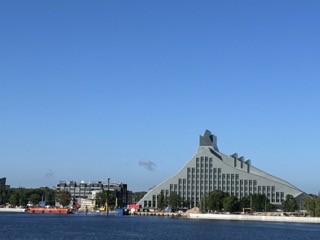The first day of the conference went well, and the academic programme was not too overwhelming, as it tends to be on the first day.
The day opened at 09.15 with an opening ceremony. There was a welcome from the Local Organizing Committee and from the EAHIL board as well as a welcome from the University leadership and from the National Library (where the main event is located). This was followed by the first keynote address.
Keynote 1
Kristīne Pabērza-Ramiresa: Community-centred impact planning and evaluation for health information libraries
Kristine works for IFLA, and she started her keynote with a brief overview of IFLA’s work. Kristine is working on demonstrating library impact, and her keynote concerned this topic. How can we demonstrate the value of a library? We are pummeling stakeholders and leaders with how important we are and how valuable we are to the institutions we serve, but the information is not hitting its mark. We have to know who we are talking to and define our goals for what we want to achieve, Kristine said.

Kristine talked about how our (meaning librarians) perspective differs from e.g. stakeholder perspectives, and that this is part of the problem. We want to focus on services and activities, while stakeholders might be more interested in ROI and impact. We have to adapt what we talk about to what they are interested in, otherwise we will not get through with the message.
We often have problems understanding impact. Most of us have routines for assessment and evaluation, but we often stop at user satisfaction. To measure impact, Kristine said, we have to stop confusing performance and satisfaction measures with outcome and impact measures. If we really want to measure impact, we have to move beyond user satisfaction studies, and we must develop real curiosity and reflection. Kristine went on to talk about the Community Centered Logic Model and how to use it to match the library services to real user needs.

After a coffee break, it was time for my first workshop of the conference.
Workshop
Marydee Ojala: Finding out way to effective use of GenAI tools (with some warning signs as well)
The first time I met Marydee was at a conference called Internet Librarian International that took place in London. It was a loooong time ago! 🙂 I remember it quite well, though, because Marydee was talking about alternative search engines to Google back then, and I had a lot of fun testing a whole bunch of them. This time, the theme was generative AI, more specifically large language models like ChatGPT. Marydee talked about how prompt engineering is something that everyone is talking about, but that it means different things to different people. Prompting should not be confused with ordinary searching.
Marydee went on to talk about more general things about generative AI, like how it is not good for factfinding, but it can be very useful for creative writing and brainstorming. It is a statistical predictive analysis, and it doesn’t retrieve things – it makes things. We call them different things, like chatbots, assistants, agents or copilots, but they are all much the same things. These GPTs have no sense of humour or satire, and it has no personality. Sometimes, we can also wonder what matter they are trained on, seeing as things from satire websites such as The Onion, sometimes crop up.
As most of us have already discovered, asking the right questions is imperative for what answers you get. You have to be very specific and detailed in your prompting, and you can tell the bot to say that it doesn’t know if it doesn’t know the answer. This can help to minimize the hallucinations. So – we can actually tell it to not make things up.
There are many frameworks for prompt engineering, like RISE (role, input, steps, expectations) OR PAR (problem, action, results). The language we use is very important, Marydee said, so if we ask the bot to give us an answer on the value of libraries, it will generate a different answer than if we ask it to explain the worth of libraries or ROI of libraries.
When it comes to prompts, it can be useful to use one of the frameworks, but the most important thing is to be specific. You can tell the bot:
- Role – which role do you want the chatbot to be (add context)
- Theme – what do you want it to do? Give examples of steps.
- Format – what output do you want? A list? A paragraph? Image?
- Tone – what tone should it be? Academic style? Blog post?
You can also ask the bot to suggest good prompts and you can tell it to improve itself. You should check the citations, and you can tell the bot to fix the errors it makes.
Marydee also talked about some of the ethical challenges we face, and that we should educate ourselves on these matters. All Danish papers recently announced that they have joined forces to sue OpenAI for copyright infringement, and it remains a large problem.
—
So – after this there were sponsor presentations and lightning poster presentations.
—
In the evening, there was an optional walking tour of Riga and a welcome reception at a museum.
